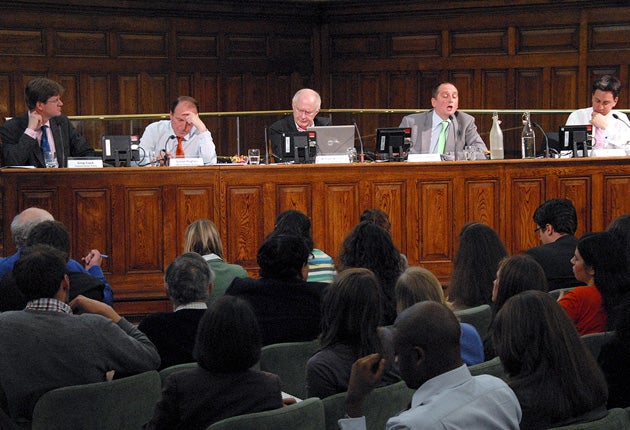For one night only? Climate change back on election agenda

climate change came back into the election as a live issue yesterday when the three main parties clashed over each other's credentials for fighting global warming.
At a hustings chaired by The Independent, the Energy and Climate Change Secretary, Ed Miliband, attacked his Conservative shadow, Greg Clark, over the number of Tory candidates who are climate sceptics, and hit out at his Liberal Democrat counterpart, Simon Hughes, over what he called the "massive hole" in the Lib Dem climate strategy, which he said was left by the party's refusal to countenance nuclear power.
Mr Clark responded by claiming that Labour's record on tackling the climate problem after 13 years in power was "feeble", while Mr Hughes said it was too late for Labour to claim it was green. "Ed talks a good talk, but renewables targets are not met, five per cent not 10 per cent, fuel poverty not met, air quality targets not met ... the Government hasn't delivered," he said.
Joined on the platform by Darren Johnson, the Green Party parliamentary candidate for Lewisham Deptford, the three main spokesmen clashed at a meeting organised by Ask The Climate Question, a coalition of nine environment and development charities and pressure groups, which has been trying to bring global warming back to the forefront of the election agenda. Until Labour and the Liberal Democrats launched their environment manifestos on Sunday, and the Conservatives launched their quality of life manifesto yesterday, climate change has hardly been mentioned.
That changed at yesterday's meeting, where in front of an invited audience of 250 people in central London, the four spokesmen agreed climate change is real, man-made and needs to be dealt with urgently. But they differ on the detail of how to go about it, in some cases widely.
Nuclear power is one of the starkest differences, with the Labour Government and the Tories embracing it as part of a low-carbon future because it produces virtually no CO2 in generating electricity. However, the Liberal Democrats and the Greens both rule out a generation of new nuclear power stations that the other parties are contemplating.
It was expensive, said Mr Hughes, would take too long to come on-stream, the waste couldn't be dealt with safely, and would undermine investment in renewables: "It's a completely foolish delusion. We don't need it and we shouldn't have it."
But Mr Miliband said: "The scale of climate change is sufficiently great it would be wrong to reject any low-carbon tool we have." Mr Miliband went on to claim that the Tories were fielding a number of climate-sceptic candidates, and that climate change was at the bottom of a list of priorities for would-be Conservative MPs. He challenged Mr Clark over the views of Torbay candidate Marcus Wood, who has said he is "sceptical" over man-made global warming. Mr Clark said people across the country had different views, adding: "I don't agree with him. I've never heard of him."
Mr Johnson warned that a "massive transformation" of the economy was needed, and said the scale of the challenge was huge because of decades of "dithering and inaction".
The Green Party is hoping to make its first breakthrough at Westminster, targeting three constituencies in particular, including Mr Johnson's, which it believes are winnable and would give it a new influence on the green agenda.
Join our commenting forum
Join thought-provoking conversations, follow other Independent readers and see their replies
Comments
Bookmark popover
Removed from bookmarks